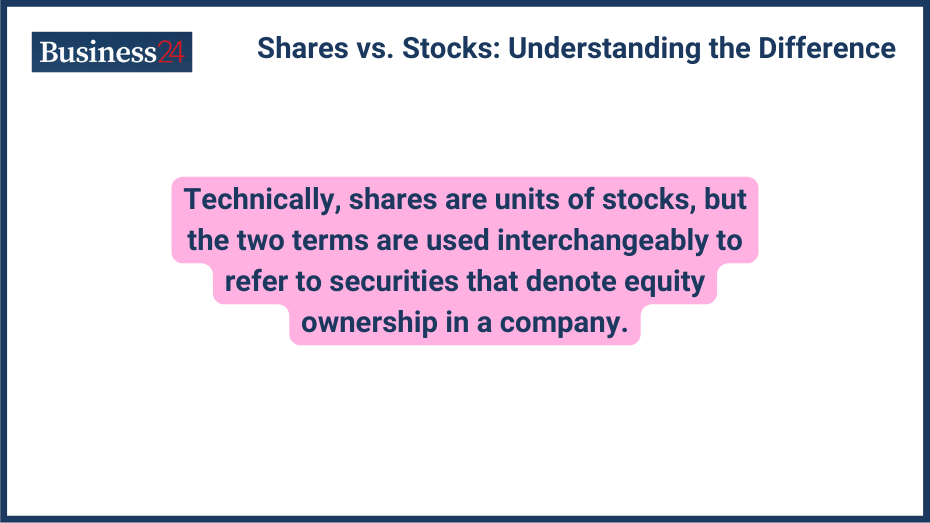
Shares are units of stocks, but the two terms are used alternately to refer to securities that mean equity ownership in a company.
For beginner investors or traders, there could be confusion about the difference between stocks and shares. The terms “stocks” and “shares” are often used interchangeably, particularly in everyday conversation. The simplest way to understand the difference is that the shares are single units of the company’s stake, and the collection of shares is known as stock.
What is a Stock?
A stock is a piece of ownership in a company. For example, if you buy 100 shares of NIVIDA that means you are a stockholder in NIVIDIA with 100 shares in your portfolio. When a company needs to raise money for operations or to pay debt or other things, it can sell shares of its ownership. Investors then buy and sell these shares on a stock exchange. By buying a stock, you become a part-owner of the company, and the number of shares you own shows how much of the company you own.
Types of Stocks
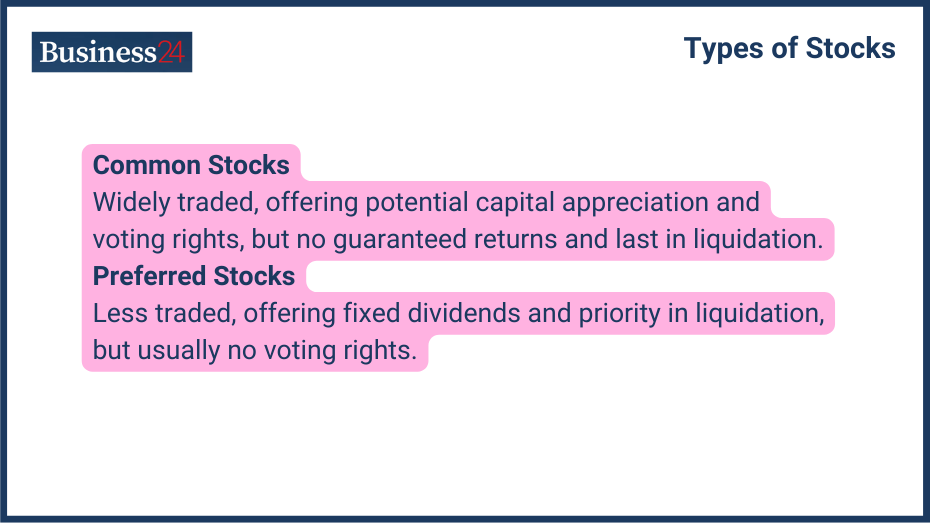
There are two primary types of stocks:
- Common Stocks: In day-to-day life, when you hear about any trading activity, you are probably hearing about common stocks; these are the most widely traded type of stock. Common stocks offer investors the potential for capital appreciation and the right to vote on certain company matters like board member elections. However, common stockholders typically don’t receive a guaranteed return on their investment and are last in line to receive company assets in case of liquidation.
- Preferred Stocks: Preferred stocks are less traded stocks and offer certain privileges over common stock, such as a fixed dividend payout or priority in receiving assets during liquidation. However, preferred stockholders typically don’t have voting rights on company matters.
Characteristics of Stocks
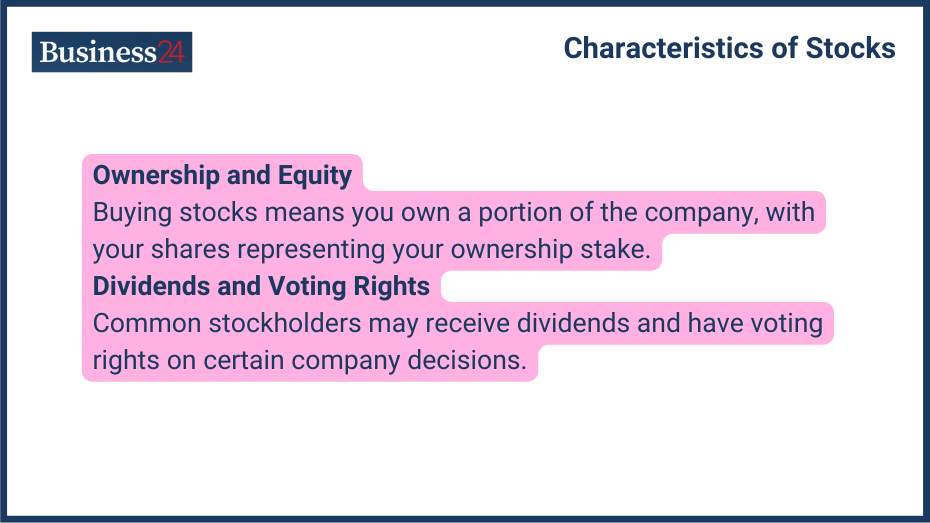
- Ownership and Equity: When you buy stocks in a company, you are a part owner, yes! Owner of a big company. The number of shares you hold tells the proportional ownership stake in the company.
- Dividends and Voting Rights: Not always, but whenever the company announces dividends, common stockholders receive some fixed percentage of the profit generated. Also, holding stocks in the company gives you voting rights on certain company decisions.
Stocks based on the market terminologies:
Growth stocks: These stocks grow and earn faster than the market average. They rarely offer dividends, so investors aim for capital appreciation. A start-up tech company might offer this type of stock.
Income stocks: These stocks consistently pay dividends, providing regular income for investors. An established utility company’s stocks are a good example of income stocks.
Value stocks: These stocks usually have a low price-to-earnings (PE) ratio, making them cheaper than those with higher PE ratios. They can be either growth or income stocks. Investors buy value stocks expecting the price to rebound soon.
Blue-chip stocks: These are shares of big, well-known companies with a solid growth history. They generally pay dividends and are popular among investors due to their reliability.
Stocks can also be categorized by market capitalization and size into large-cap, mid-cap, and small-cap stocks. Shares of small companies are called microcap stocks, while low-priced stocks are known as penny stocks.
Are shares and stocks the same?
There is very little difference but, No! Shares and stocks are not exactly the same. The small difference is that “stock” means owning part of one or more companies. In contrast, a “share” refers to a unit of ownership in a single company.
What is a Share?
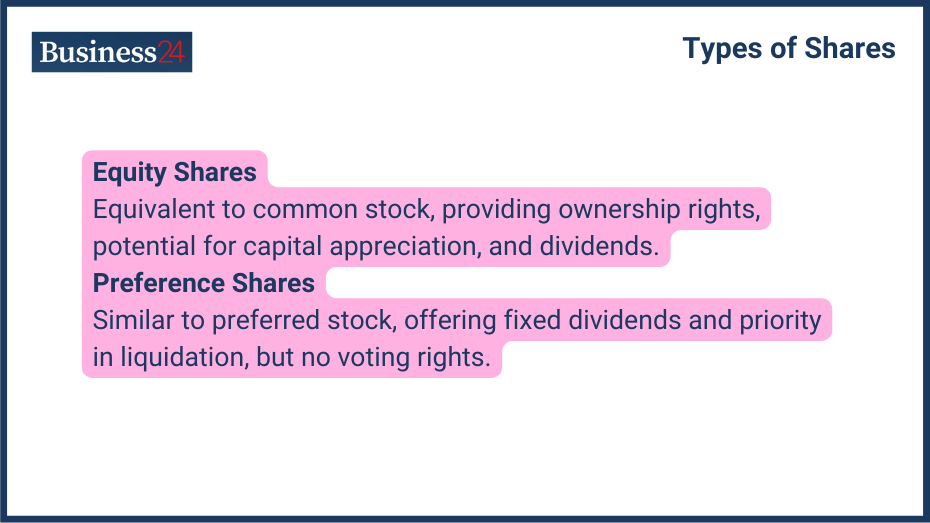
Like a stock, a share represents ownership in a company, but a share is a unit of ownership. If you hold 100 shares of NVIDIA, it’s not 100 stocks; the share represents the units. Owning a share grants you a claim on the company’s assets and profits. However, “share” is often used more broadly and can encompass ownership in other entities besides corporations, such as mutual funds or cooperatives.
Types of Shares
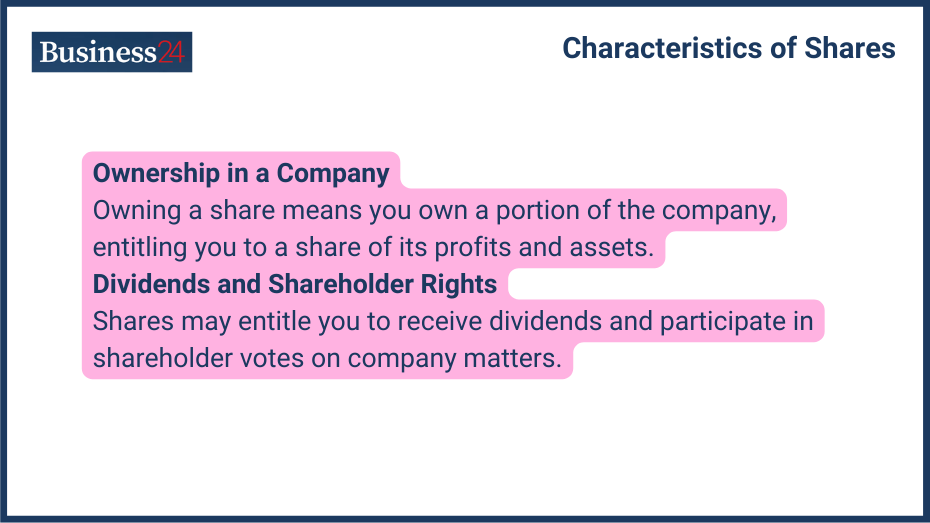
There are two main types of shares within companies:
- Equity Shares: These are functionally equivalent to common stock, granting ownership rights and potential for capital appreciation and dividends.
- Preference Shares: These are similar to preferred stock, offering fixed dividend payouts and priority in asset distribution during liquidation, but without voting rights.
Characteristics of Shares
- Ownership in a Company: Owning a share represents a portion of ownership in a company, entitling you to a proportional share of the company’s profits and assets.
- Dividends and Shareholder Rights: Depending on the type of share, you might be entitled to receive dividends and participate in shareholder votes on company matters.
Which is better, stock market or share market?
While the words stocks and shares have little difference, there is no difference between the share and stock markets. Because the stocks are the collection of shares where stocks are traded, it’s obvious shares are traded too.
Key Differences Between Stocks and Shares
Terminology and Usage
- Geographical Variations: “stock” is more commonly used in the United States and some other countries, while “share” is preferred in the United Kingdom and other regions.
- Contextual Differences: “Stock” often refers to the overall collection of shares issued by a company, while “share” refers to a single unit of ownership. So, you might say you “own shares” in a company, but you “buy or sell stock” on a stock exchange.
Legal and Financial Aspects
- Share Certificates vs. Stock: Traditionally, shares were represented by physical certificates. However, most stocks and shares are now electronically recorded.
- Regulatory Implications: The regulations governing stock issuance and trading might differ slightly from those for shares in some jurisdictions.
Investment Considerations
Risks and Benefits
- Market Volatility: Stocks and shares are the most misinterpreted as risky investments due to corrections and crashes in between, which are normal things in cycles. Stock and share prices fluctuate significantly due to company performance, economic conditions, and investor sentiment.
- Potential Returns: Investing in stocks and shares has the potential to generate significant returns through capital appreciation and dividend payouts.
How to Buy and Sell
- Stock Exchanges: To connect buyers and sellers, there are various stock exchanges worldwide. Advancement has made exchanges electronic, making it easy for users to operate. There are various stock exchanges worldwide, such as the New York Stock Exchange (NYSE) and the London Stock Exchange (LSE).
- Brokerage Accounts: You cannot buy or sell stocks in an exchange; you need an intermediate person to place your orders in the exchange. You can open a brokerage account with a licensed broker to buy and sell shares. Brokers provide a platform for buying and selling stocks and shares, as well as research and educational resources.
What is 100 shares of stock called?
There isn’t a specific term for 100 shares of stock. It simply refers to “100 shares” or “a holding of 100 shares” in a particular company. A lot refers to a specific number of shares that are traded as a unit, so you might encounter a lot in any exchange which has 100 shares but it is not common in all the stock exchanges. A lot can be different in different stock exchanges.
FAQs
Q. is 1 stock equals 1 share?
This is not entirely accurate. 1 share is a unit in the company, while stock represents the company’s shares.
Q. Are stocks always more profitable than shares
Profitability depends on the specific company and market conditions. In the matter of profitability, stocks and shares are the same.
Q: How do I buy and sell stocks or shares
You need a brokerage account to participate in the stock market. Brokers provide platforms for buying and selling on stock exchanges like the NYSE, NSE, or LSE.
Disclaimer
eToro is a multi-asset platform which offers both investing in stocks and cryptoassets, as well as trading CFDs.
Please note that CFDs are complex instruments and come with a high risk of losing money rapidly due to leverage. 51% of retail investor accounts lose money when trading CFDs with this provider. You should consider whether you understand how CFDs work, and whether you can afford to take the high risk of losing your money
This communication is intended for information and educational purposes only and should not be considered investment advice or investment recommendation. Past performance is not an indication of future results.
Copy Trading does not amount to investment advice. The value of your investments may go up or down. Your capital is at risk.
Don’t invest unless you’re prepared to lose all the money you invest. This is a high-risk investment and you should not expect to be protected if something goes wrong. Take 2 mins to learn more
eToro USA LLC does not offer CFDs and makes no representation and assumes no liability as to the accuracy or completeness of the content of this publication, which has been prepared by our partner utilizing publicly available non-entity specific information about eToro.
